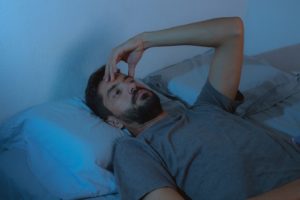 A good night’s rest is a precious thing. Unfortunately, millions of Americans find it difficult to get an adequate amount of high-quality shuteye. Are you among them? If so, have you considered that your temporomandibular joint (TMJ) might be to blame? This complex joint, which connects your lower jaw to the rest of your skull, can cause serious consequences when it is suffering from TMJ disorder (TMD). Let’s talk more about the connection between TMD and sleep problems and how proper treatment may address both issues.
A good night’s rest is a precious thing. Unfortunately, millions of Americans find it difficult to get an adequate amount of high-quality shuteye. Are you among them? If so, have you considered that your temporomandibular joint (TMJ) might be to blame? This complex joint, which connects your lower jaw to the rest of your skull, can cause serious consequences when it is suffering from TMJ disorder (TMD). Let’s talk more about the connection between TMD and sleep problems and how proper treatment may address both issues.
TMD and Sleep Apnea
Obstructive sleep apnea (OSA) is a serious sleep disorder characterized by repeated pauses in breathing throughout the night, which occur when tissues in the throat block the free flow of air. It can cause you to feel exhausted despite spending a full 7 – 8 hours in bed. It can even increase your risk of several health conditions, including cardiovascular disease. OSA can have numerous causes, including anatomical issues in the throat and jaw. If your jaw is not properly aligned, it can affect the positioning of the tongue while you sleep. In turn, the tongue may contribute to airway blockages.
TMD and Bruxism
Nocturnal bruxism (grinding and clenching of the teeth that occurs during sleep) can worsen symptoms of TMD. TMD can also contribute to bruxism. Not only is bruxism horrible for dental health, but it can also interfere with your rest. For example, it can cause micro-arousals throughout the night that prevent you from fully benefiting from the deeper stages of sleep.
TMD and Headaches
Headaches are one of the most common symptoms of TMD. Problems with the jaw can cause muscle tension throughout the face and neck, leading to painful and frequent head pain. In some people, TMD is even associated with migraines. The discomfort caused by headaches and migraines may make it difficult for you to fall asleep.
What You Can Do
If you are experiencing any TMD symptoms, such as jaw pain, clicking in the jaw, headaches, or facial pain, visit a dentist who offers TMJ therapy. After they learn about your situation, they can recommend a treatment. For example, you might need orthodontia to correct a misaligned bite. Or, you may need an oral appliance to prevent nighttime teeth grinding. For some people, BOTOX® injections are the best option because they can relax overworked facial muscles.
If you suffer from OSA, you might need a different solution. Your dentist may help you arrange to undergo a sleep test before they recommend an appropriate treatment.
TMD is often connected to sleep problems. Caring well for your jaw could be a big step toward achieving the high-quality rest you deserve!
Meet the Practice
Dr. Erin Page is the highly experienced, skilled dentist at Capital Smiles in Schenectady. She offers a broad range of treatments, including multiple forms of TMJ therapy. She is also proud to provide oral appliance therapy for sleep apnea. To learn how she may be able to help you start enjoying better sleep, contact our office at 518-374-0317.
